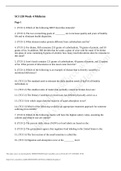Sci 228 week 4 exam Study guides, Class notes & Summaries
Looking for the best study guides, study notes and summaries about Sci 228 week 4 exam? On this page you'll find 46 study documents about Sci 228 week 4 exam.
Page 4 out of 46 results
Sort by
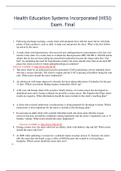
-
NURS 572A hesi..
- Exam (elaborations) • 64 pages • 2021
-
- $16.99
- + learn more
Health Education Systems Incorporated (HESI) Exam. Final 1. Following discharge teaching, a male client with duodenal ulcer tells the nurse the he will drink plenty of dairy products, such as milk, to help coat and protect his ulcer. What is the best followup action by the nurse. 2. A male client with hypertension, who received new antihypertensive prescriptions at his last visit returns to the clinic two weeks later to evaluate his blood pressure (BP). His BP is 158/106 and he admits that...
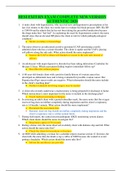
-
HESI EXIT RN EXAM COMPLETE NEW VERSION AUTHENTIC 2020, with Rationales : Ace your Study!
- Exam (elaborations) • 153 pages • 2021
-
- $18.49
- + learn more
HESI EXIT RN EXAM COMPLETE NEW VERSION AUTHENTIC 2020 1. A male client with hypertension, who received new antihypertensive prescriptions at his last visit returns to the clinic two weeks later to evaluate his blood pressure (BP). His BP is 158/106 and he admits that he has not been taking the prescribed medication because the drugs make him “feel bad”. In explaining the need for hypertension control, the nurse should stress that an elevated BP places the client at risk for which pathophysio...
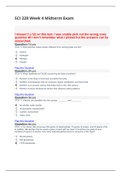
-
SCI 228 Week 4 Midterm Exam
- Exam (elaborations) • 11 pages • 2020
- Available in package deal
-
- $15.98
- + learn more
SCI 228 Week 4 Midterm Exam Question: (TCO 1) What element makes protein different from carbohydrate and fat? Question: (TCO 1) Which statement is FALSE concerning the field of nutrition? Question: (TCO 1) Vitamins are classified into two groups, ________ and ________. Question: (TCO 1) For dinner, Bill consumes 255 grams of carbohydrate, 70 grams of protein, and 50 grams of fat. In addition, Bill decides that he wants a glass of wine with his meal. If he drinks one glass of wine containing 8 gr...
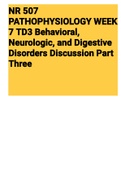
-
Exam (elaborations) NR 507 PATHOPHYSIOLOGY WEEK 7 TD3 Behavioral, Neurologic, And Digestive Disorders Discussion Part Three
- Exam (elaborations) • 42 pages • 2022
-
- $8.49
- + learn more
Exam (elaborations) NR 507 PATHOPHYSIOLOGY WEEK 7 TD3 Behavioral, Neurologic, And Digestive Disorders Discussion Part Three This week's graded topics relate to the following Course Outcomes (COs). 1 Analyze pathophysiologic mechanisms associated with selected disease states. (PO 1) 2 Differentiate the epidemiology, etiology, developmental considerations, pathogenesis, and clinical and laboratory manifestations of specific disease processes. (PO 1) 3 Examine the way in which homeo...
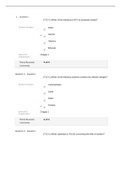
-
SCI 228 Week 4 Midterm Exam
- Exam (elaborations) • 24 pages • 2021
-
- $22.49
- + learn more
Question: (TCO 1) What element makes protein different from carbohydrate and fat? Question: (TCO 1) Which statement is FALSE concerning the field of nutrition? Question: (TCO 1) Vitamins are classified into two groups, ________ and ________.
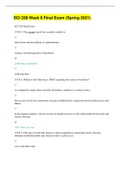
-
SCI 228 Week 8 Final Exam (Spring 2021) Questions and Answer Solutions | 100% Verified GRADE (RETAKE)
- Exam (elaborations) • 22 pages • 2021
- Available in package deal
-
- $10.99
- + learn more
SCI 228 Week 8 Final Exam (Spring 2021) SCI 228 Final Exam (TCO 1) The second step of the scientific method is: observation and description of a phenomenon. testing a research question or hypothesis. generating a hypothesis. collecting data. (TCO 1) Which of the following is TRUE regarding the science of nutrition? As compared to many other scientific disciplines, nutrition is a young science. Discoveries by the first nutritional scientists established the connection between deficiencies and ill...
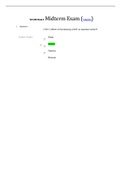
-
SCI 228 Week 4 Midterm Exam (Collection)/ (SOLVED) Questions and Answers | Download To Score An A+
- Exam (elaborations) • 201 pages • 2021
- Available in package deal
-
- $10.99
- + learn more
SCI 228 Week 4 Midterm Exam (Collection) 1. Question : (TCO 1) Which of the following is NOT an essential nutrient? Student Answer: Water Alcohol Vitamins Minerals Instructor Explanation: Chapter 1 Question 2. Question : (TCO 1) Which of the following nutrients contains the element nitrogen? Student Answer: Carbohydrates Lipids Water Proteins Instructor Explanation: Chapter 1 Question 3. Question : (TCO 1) Which statement is FALSE concerning the field of nutrition? Student Answer: Nutrition is t...
SCI 228 Week 4 Midterm Exam - Questions and Answers SCI 228 Week 4 Midterm Exam - Questions and Answers
SCI 228 Week 4 Midterm Exam
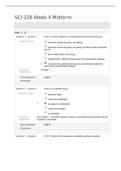
-
SCI-228 Week 4 Midterm
- Exam (elaborations) • 13 pages • 2021
-
- $12.99
- + learn more
SCI-228 Week 4 Midterm Grading Summary Grade Details - All Questions Page: 1 2 Question 1. Question : (TCO 1) Control subjects in a double-blind test of a new drug are Student Answer: informed of what drug they are getting. informed of what drug they are getting but their private physicians are not. given larger doses of the drug. infected with a different disease than the experimental subjects. not given the experimental drug but are otherw...

How did he do that? By selling his study resources on Stuvia. Try it yourself! Discover all about earning on Stuvia



![SCI 228 Week 4 Midterm Exam - Questions and Answers [A Guide to Grade A]](/docpics/6091ef7c94025_1096053.jpg)
